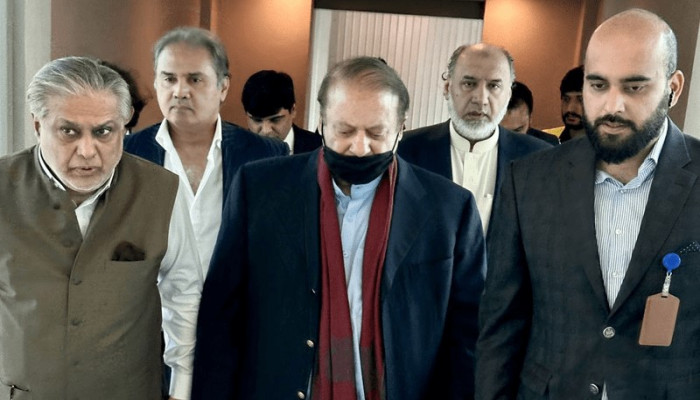Pakistan's former leader Nawaz Sharif returns after nearly four years in self-exile
- In Reports
- 05:50 PM, Oct 21, 2023
- Myind Staff
Three-time Pakistani Prime Minister Nawaz Sharif has made a notable return to his home country after a self-imposed exile spanning four years. This homecoming marks a strategic move as he positions himself for a potential political resurgence in anticipation of the forthcoming elections.
Pakistan currently finds itself grappling with a confluence of security, economic, and political challenges, further exacerbated by the postponement of the polls to January 2024. Nawaz Sharif's primary political rival Imran Khan is currently detained in jail.
In response to Sharif's return, Khawaja Muhammad Asif, a prominent leader within Sharif's Pakistan Muslim League-Nawaz (PML-N) party, expressed optimism, stating, "This is a time for hope and celebration. His return bodes well for Pakistan's economy and its people." Sharif's reentry into the political landscape is expected to have significant implications for the nation, with many closely watching how it will shape the upcoming political dynamics and electoral landscape.
According to reports, Nawaz Sharif, the former three-time Pakistani Prime Minister, returned to Pakistan after four years of self-imposed exile. This return signifies his bid for a political comeback, particularly in the lead-up to the forthcoming elections.
In 2017, Nawaz Sharif was disqualified from holding public office following a Supreme Court ruling on corruption allegations. In the year following his disqualification, Nawaz Sharif faced a seven-year prison sentence for corruption allegations, which he strongly contested. His sentence was temporarily suspended on medical grounds permitting him to receive treatment abroad. However, the condition was that he must return within four weeks, a condition he did not meet.
Notably, Nawaz Sharif's return occurred shortly after an Islamabad court granted him protective bail, safeguarding him from arrest until his court appearance. This development has raised the political stakes as Pakistan's electoral landscape is already marked by considerable tension.
In recent months, Pakistan has experienced frequent protests due to Imran Khan's removal from power, economic hardships like rising prices, and discontent with the powerful military. Khan's supporters have claimed military involvement in his ousting, an accusation the military denies. Nawaz Sharif was also held previously and military responsible for his political setbacks. The military has exerted substantial influence in Pakistan's politics since the country's independence in 1947. Notably, Sharif faced removal in 1999 through a coup, and in 1993, he was ousted as Prime Minister by a military-backed president.
Nawaz Sharif's younger brother, Shehbaz, welcomed the news of his brother's protective bail, asserting that it was a "fundamental right." He contended that Nawaz Sharif's disqualification was based on a "fictitious and fabricated story" and that he had been ensnared in "absurd cases" while being subjected to mistreatment.
Shehbaz Sharif who was Prime Minister in 2022, retained this position until August of the same year, when his government was replaced by a caretaker administration due to the dissolution of parliament ahead of the national election scheduled for early next year. His tenure was marked by significant economic challenges, including inflation, soaring fuel and food prices, and an ailing economy, which has impacted the popularity of the PML-N party. Nawaz Sharif is expected to lead the party's election campaign.
Image source: CNN







Comments